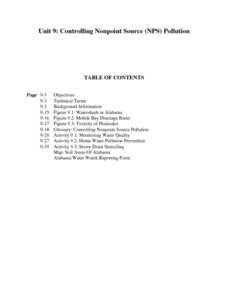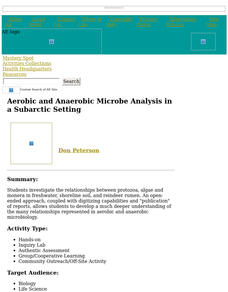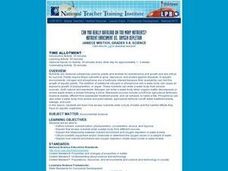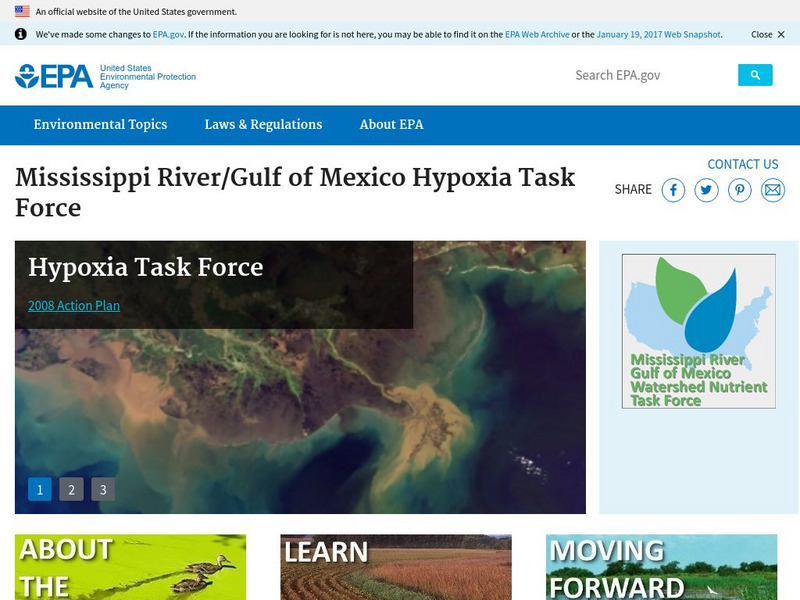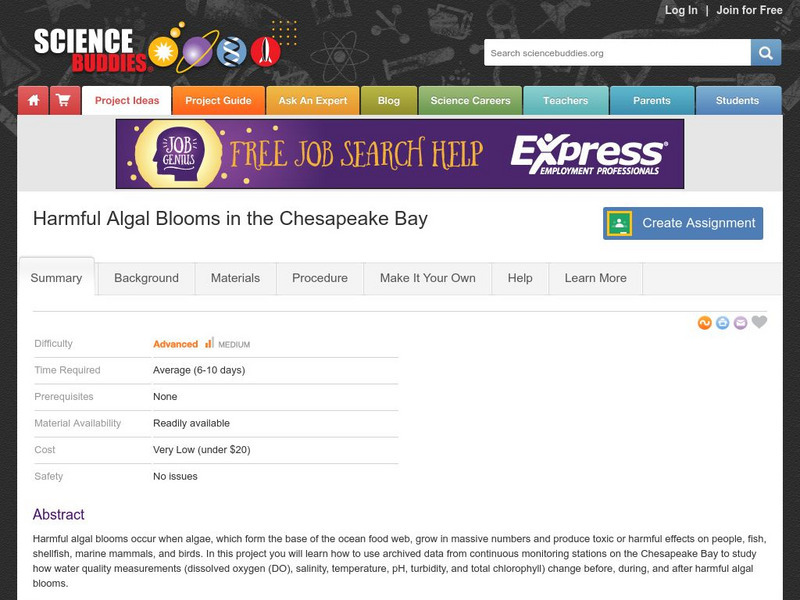Curated OER
The Marvels of Mud
Young scientists roll up their sleeves and get a little dirty in this three-day earth science investigation. Following the scientific method, children monitor the growth of algae in pond water samples in order to determine...
Salt River Project
How Do We Clean Polluted Water?
How do we clean up oil spills and other pollutants in the water? Explore water treatment strategies with a set of environmental science experiments. Groups remove oil from water, work with wastewater treatment, and perform a water...
Virginia Department of Education
Evidence of Evolution
What an impression fossils make! For this activity, aspiring paleontologists view fossils and construct a timeline to further understand how the lack of natural adaptation caused historical organisms to become extinct. While they...
Curated OER
Water Filtration
As an example of nature's water filtering system, young ecologists conduct an experiment in the lab. They construct a funnel out of a plastic bottle, fill it with specified layers of materials that simulate layers of soil, then run muddy...
Curated OER
The Biogeochemical Cycles
The majority of this presentation is a collection of diagrams and graphs that back your lecture on biogeochemical cycles. The last few slides define ecosystems and the Gaia hypothesis. You may find these slides valuable, but will...
Curated OER
Environmental Issues And Energy Alternatives Crossword
For this environmental issues worksheet, students solve 16 clues focusing on the forms of renewable and non-renewable energy, global warming and acid rain.
Curated OER
Salt Marsh in a Pan
Students create a model of a salt marsh to discover the impact of pollution and human activities on water-based habitats including bays and the ocean. They recognize the relationship between natural and developed areas. Students impact...
Curated OER
Teaching about the Effect of Photosynthesis and
Students demonstrate the effects of photosynthesis and respiration. They decide which variables to analyze in a microcosm study. They produce a written paper, oral presentation, poster, or multi-media presentation
Curated OER
Controlling Nonpoint Source Pollution
Students examine factors affecting water quality. They test water in a local body of water to determine its quality. They collect data and continue monitoring the water monthly. They assess water quality in the home and on the farm.
Curated OER
Ecosystem Interdependence
Young scholars outline a scenario demonstrating ecosystem interdependence. They explain the effects of this change according to the food web. They give a positive example such as increased rain and have the students call out answers to...
Curated OER
Chemistry And The Nitrogen Cycle
Students investigate the factors that compose the nitrogen cycle. The harmful effects of acid rain and ozone depletion are also discussed in the lesson. Students define the nutrient that is often limiting to plant growth through...
Curated OER
Aerobic and Anaerobic Microbe Analysis in a Subarctic Setting
Students investigate the relationships between protozoa, algae and monera in freshwater, shoreline soil, and reindeer rumen. They publish reports of their findings.
Curated OER
Nutrient Enrichment vs. Oxygen Depletion
Students investigate how excess nutrients enter a body of water, and the harmful effects they have on aquatic organisms.
Curated OER
Hypoxia and the Dead Zone in the Gulf of Mexico
Students investigate the causes of hypoxia, the characteristics of a watershed, and how the actions and management practices of people can both negatively and positively affect aquatic ecosystems.
Curated OER
Ecology and the Conservation of Natural Resources
Students examine the components of ecosystems. They compare and contrast an ecosystem to an aquatic ecosystem. They examine a local ecosystem and discuss its components.
Curated OER
Diurnal Cycling Experiments
High schoolers carry out an experiment to monitor diurnal fluctuations in dissolved oxygen, carbon dioxide, pH, and water temperature. They determine the CO2 and pH of the samples (and optionally, dissolved oxygen). Students complete...
Curated OER
Determination of Phosphates
Students engage in a laboratory lesson in order to increase understanding of the impact of phosphates at the chemical and ecological levels. The lab exercise is completed with the goal of getting them to predict the outcomes and future...
Curated OER
Water Density Boundaries
Young scholars create observable layers in water that represent a separation based upon density differences. They model density boundaries using differences in temperature and salinity. They, in groups, perform a meaningful experiment...
Curated OER
Amphipods
Learners identify organisms that live at the bottom of the body of water. In this biology lesson, students evaluate the effects of pollution to amphipods population. They examine collected data and create a bar graph comparing them.
Other
Environmental Challenges in Farm Management: Change in Habitats: Eutrophication
This site from the University of Reading provides the definition of eutrophication as well as further information about this naturally occurring phenomenon.
US Environmental Protection Agency
Epa: Mississippi River / Gulf of Mexico Hypoxia Task Force
Learn about the task force formed to help the public understand the causes and effects of eutrophication in the Gulf of Mexico.
NOAA
Noaa: Estuaries 101 Curriculum: Nutrients in an Estuary
An overload of nutrients, called eutrophication (Greek for "good-nutrition"), can be harmful to estuaries. This phenomenon is also referred to as "over-enrichment," or "nutrient pollution". Students will investigate the range of...
Science Buddies
Science Buddies: Harmful Algal Blooms in the Chesapeake Bay
Harmful algal blooms occur when algae, which form the base of the ocean food web, grow in massive numbers and produce toxic or harmful effects on people, fish, shellfish, marine mammals, and birds. In this project you will learn how to...
Science Education Resource Center at Carleton College
Serc: Lab 7: Nitrates and Phosphates and Algae, Oh My!
A lab experiment, in a series of experiments, that investigates fisheries. In this lab, students test the effects of fertilizers and other pollutants on a model ecosystem. Students also examine 2 years of ocean color (chlorophyll...
Other popular searches
- Eutrophication Worksheets
- Eutrophication Experiments
- Eutrophication Unit Plans
- Lesson Plans Eutrophication
- Artificial Eutrophication
- Cultural Eutrophication








